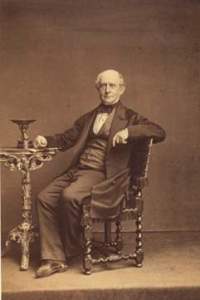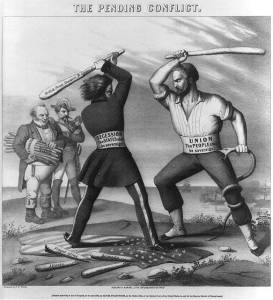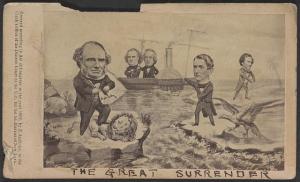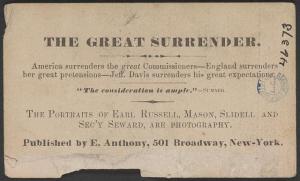Secretary of State William H. Seward was not going to let the British distribute aid to rebels in Union prison camps. From the Richmond Daily Dispatch December 12, 1864:
The British Relief Fund for Confederate prisoners — Seward Refuses to Allow its Distribution.
Lincoln, on Thursday, sent a message to the Senate in reply to Mr. Sumner’s resolution calling upon him to furnish any information in his possession relative to a proposition of British subjects to give aid to the rebellion. Lord Wharncliffe informs Mr. Adams that the Liverpool Bazaar produced about £17,000, and asks permission for an accredited agent to visit the military prisons within the Northern States and distribute aid to their inmates. He denies that any political aid is aimed at, or any imputation that Confederate prisoners are deprived of such attentions as the ordinary rules enjoin. He says:
“The issue of the great contest will not be determined by individual suffering, be it greater or less; and you, whose family name is interwoven with American history, cannot view with indifference the suffering of American citizens, whatever their State or opinions.”
Mr. Adams replied that it has never been the desire of the Government to treat with unnecessary or vindictive severity “any of the misguided individual parties in this deplorable rebellion who have fallen into its hands in the regular course of the war, and that he should greatly rejoice if the effects of such sympathy could be extended to ministering to their mental ailment as well as their bodily suffering, thus contributing to put an end to a struggle which otherwise is too likely to be only procrastinated by their English sympathizers.” Mr. Seward replies as follows to the application received through Mr. Adams:
Department of State, Washington, December 5, 1864.
Sir:
I have received your dispatch of the 18th of November, No. 807, together with the papers therein mentioned, viz: a copy of a letter which was addressed to you on the 12th of November last by Lord Wharncliffe, and a copy of your answer to that letter. You will now inform Lord Wharncliffe that permission for an agent of the committee described by him to visit the insurgents detained in the military prisons of the United States and distribute among them seventeen thousand pounds of British gold is disallowed. Here it is expected that your correspondence with Lord Wharncliffe will end. That correspondence will necessarily become public.
On reading it, the American public will be well aware that while the United States have ample means for the support of prisoners as well as for every exigency of the war in which they are engaged, the insurgents who have rushed into that coalition are suffering no privations that appeal for relief to charity either at home or abroad. The American public will be likely to reflect that the sum thus insidiously tendered in the name of humanity constitutes no large portion of the profits which its contributors may be justly supposed to have derived from the insurgents by exchanging with them arms and munitions of war for the coveted productions of immoral and enervating slave labor.
Nor will any portion of the American people be disposed to regard the sum thus ostentatiously offered for the relief of captured insurgents as a too generous equivalent for the devastation and dissolution which a civil war, promoted and protracted by British subjects, has spread throughout the States which before were eminently prosperous and happy. Finally, in view of this last officious intervention in our domestic affairs, the American people can hardly fail to recall the warning of the Father of our Country, directed against two great and intimately connected public dangers, namely, sectional faction and foreign intrigue.
I do not think the insurgents have become debased, although they have sadly wandered from the ways of loyalty and patriotism. I think that, in common with all our countrymen, they will rejoice in being saved by their considerate and loyal Government from the grave insult which Lord Wharncliffe and his associates, in their zeal for the overthrow of the United States, have prepared for the victims of this unnatural and hopeless rebellion.
I am, sir, your obedient servant,
William H. Seward.
You can read all about the The Confederate Bazaar at Liverpool at American Civil War Round Table UK and get another look at Mr. Seward’s letter to Charles Francis Adams at Google Books[1]. An explanation of the political cartoon appears at the Library of Congress
Secretary Seward had been dealing with the British throughout the war, as can be seen by this cartoon regarding the Trent Affair:
- [1]McPherson, Edward The political history of the United States of America, during the great rebellion …. Philp & Solomons, 1865. Print. page 268.↩




